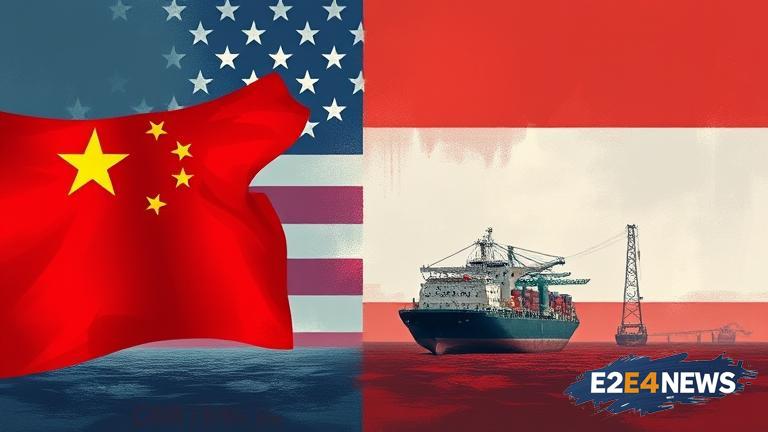China has rejected US demands to cease imports of Russian and Iranian oil, emphasizing the need to prioritize its own energy security and economic interests. The move comes as the US continues to impose sanctions on both Russia and Iran, seeking to isolate them from the global economy. China, however, has maintained its stance of non-interference in the internal affairs of other nations, while also pursuing its own strategic interests. The Chinese government has stated that it will not be swayed by external pressure, and will continue to engage in economic cooperation with countries that are willing to do business with it. This includes Russia and Iran, with which China has significant trade relationships. The US has been seeking to persuade China to stop buying oil from these countries, as part of its efforts to exert pressure on them to change their behavior. However, China has made it clear that it will not be dictated to by the US, and will make its own decisions about its energy imports. China’s refusal to comply with US demands has significant implications for the global energy market, as well as for the geopolitical balance of power. The US has been seeking to reduce its own dependence on foreign oil, while also trying to limit the ability of other countries to access energy resources. China, on the other hand, is seeking to diversify its energy imports, and reduce its reliance on any one particular supplier. The dispute between the US and China over oil imports is just one aspect of a broader struggle for influence and power in the global economy. The US has been seeking to maintain its position as the dominant world power, while China is seeking to challenge this dominance and assert its own influence. The situation is further complicated by the fact that China is a major player in the global energy market, and its decisions about oil imports have significant implications for the price of oil and the stability of the global economy. China’s refusal to stop buying oil from Russia and Iran is also seen as a sign of its growing independence and assertiveness on the world stage. The country is no longer willing to be dictated to by the US, and is instead seeking to pursue its own interests and assert its own influence. This has significant implications for the future of the global economy, as well as for the balance of power in international relations. The US will need to reassess its strategy and find new ways to engage with China, rather than simply trying to impose its will on the country. China’s decision to continue buying oil from Russia and Iran is also driven by its need to secure stable and reliable energy supplies. The country is heavily dependent on imported oil, and needs to ensure that it has a diverse range of suppliers in order to meet its energy needs. Russia and Iran are both significant oil producers, and China has established strong trade relationships with both countries. The US has been seeking to disrupt these relationships, but China is unwilling to compromise its own energy security in order to comply with US demands. The dispute between the US and China over oil imports is likely to continue, with significant implications for the global energy market and the balance of power in international relations. China’s refusal to stop buying oil from Russia and Iran is a sign of its growing assertiveness and independence, and marks a significant shift in the global balance of power. The US will need to adapt to this new reality, and find ways to engage with China that take into account its growing influence and assertiveness. The future of the global economy and the balance of power in international relations will depend on the ability of the US and China to find ways to cooperate and manage their differences. The situation is complex and multifaceted, and will require careful diplomacy and strategic thinking in order to resolve. The US and China have significant differences, but they also have a shared interest in maintaining stability and security in the global economy. By working together and finding ways to cooperate, they can help to ensure a more stable and prosperous future for all countries. The dispute over oil imports is just one aspect of a broader struggle for influence and power in the global economy, and will require careful management and diplomacy in order to resolve. China’s decision to continue buying oil from Russia and Iran is driven by its need to secure stable and reliable energy supplies, and to assert its own influence and independence on the world stage. The US will need to reassess its strategy and find new ways to engage with China, rather than simply trying to impose its will on the country. The future of the global economy and the balance of power in international relations will depend on the ability of the US and China to find ways to cooperate and manage their differences.





